For most of us, simply thinking about our early teen years can quickly produce cringe-worthy memories of awkward social interactions, questionable fashion choices, and hormonal chaos - all of which feel best left in the corners of our middle school locker. But what can often be equally uncomfortable is the tough landscape of actually parenting adolescent kids. According to our team of Client Services Coordinators and the hundreds of parents they speak with every month, problems with self-care, hygiene, and organization are among the most common issues parents are facing at home right now. So what can we do about it? 
To address this topic, we recently invited a panel of experts across multiple disciplines of behavioral science to share their top tips for parents on mastering self-care and building healthy routines at home for their children. Within days of opening registration, we had already confirmed nearly a thousand registrants looking for wisdom on this subject - further proof that this is a hot-button issue for parents today. This week, we’ll be highlighting our panel's top 4 tips for cultivating healthy routines at home and helping students help themselves. Let’s dive right in!
Tip 1: Be Mindful of Your Language
To really help your student make a change, you have to be mindful of your language. According to psychologist and cofounder of Thrive Collective, Dr. Vinita Menon, moods are contagious, and our kids can quickly pick up on the sentiment behind what we say to them. For teens, in particular, the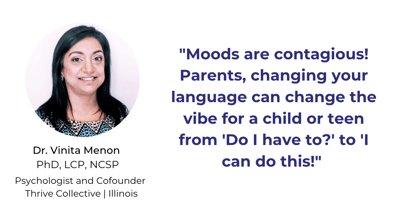 second they feel like they’re being nagged or told what to do, the interaction has already become a conflict in their minds. To prevent friction and improve the likelihood that your student will actually listen to you, our panel recommended trying to start by asking questions that help them come to their own realizations instead of telling them what to do. For example, if a student regularly forgets to brush their teeth, you may try asking what it might feel like if their teeth were clean. These types of questions encourage students to consider the benefits of doing these types of self-care routines and come to internalize their value.
second they feel like they’re being nagged or told what to do, the interaction has already become a conflict in their minds. To prevent friction and improve the likelihood that your student will actually listen to you, our panel recommended trying to start by asking questions that help them come to their own realizations instead of telling them what to do. For example, if a student regularly forgets to brush their teeth, you may try asking what it might feel like if their teeth were clean. These types of questions encourage students to consider the benefits of doing these types of self-care routines and come to internalize their value.
Another way to reach your child with mindful language is to find points of relatability. If your student’s room is a total mess, rather than lecturing about the disorder you see, try to empathize with the reasons why they’ve neglected cleaning up. This approach can allow them to see you as someone on their side. Upon some basic inquiry, you may find that they’re stressed out from school and don’t have the energy to pick up. In that case, you might try to recall a time you were exhausted and didn’t want to clean - and share how you got over it. For example, you might say, “I understand how you feel, sometimes I don’t feel like picking up my room either. Doing a little bit at a time can make it a lot easier. I could help you get started if you like.” By first connecting with how they’re feeling, and then offering reasonable solutions that you can work with them on, your student is far more likely to approach the subject with an open mind and actually take the first step to cleaning their room.
The last bit of advice on language our panel shared is to look for opportunities for positive reinforcement and encouragement. If your student has done a good job with keeping their backpack clean or has gotten into a nice groove of regular showering, acknowledging their success can be a great motivator to help keep it going. According to Megan Shaffer, an Occupational Therapist at Boston Ability Center, younger children, in particular, respond very strongly to positive reinforcement, and particularly positive self-talk. If you’re trying to help your child get into some of these self-care routines, encourage them to say things like “Go me!” or “I got this!” while they’re beginning to brush their teeth or take showers on their own.
Tip 2. Make Good Habits Easy and Bad Habits Hard
Starting new, healthy habits can be hard. For one, you’re essentially reprogramming your brain to do something it’s not used to that in the short-term feels difficult. For teens, in particular, that temporary discomfort can be a real barrier. To help break through this, Dr. Kaman Hung, an Executive Function Coach at Beyond BookSmart, recommends finding ways to make good habits easy and bad habits hard - a concept called “choice architecture.” For example, if your child has a hard time brushing their teeth, you can make it easier by getting them an electric toothbrush. If you want to encourage healthy snack choices, have fresh veggies all prepared for dipping and enjoying - and put sweets out of sight and out of reach.
Building on this subject, when it comes to helping out around the house, Dr. Menon recommends encouraging your child to pair tasks with something enjoyable for an instant reward. A few examples might be emptying the dishwasher while a favorite snack is in the microwave, listening to a podcast while folding laundry, or talking to a friend while walking the dog. Building this type of pairing habit will help your child apply this strategy with other tasks as they become older and take on more responsibilities.
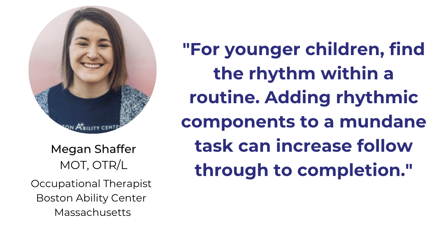
For younger children, Megan recommends finding rhythms within a routine, For example, adding rhythmic components to an otherwise mundane task, such as brushing teeth, can increase follow through to completion. She suggested playing music with the tempo your child might use while completing a given task. For children especially, this engages their body and their brain - and creates positive associations with self-care tasks that will last well into their adolescent years and beyond.
Tip 3: Find Ways to Build Your Student’s Self-Awareness
The development of self-awareness (also known as metacognition) typically happens gradually as children mature. To build this ability, Junerose Juan, a Speech-Language Pathologist who is also an Executive Function coach with Beyond BookSmart, recommends helping your child reflect on their current day-to-day routines as they’re doing them, as well as after they finish, so they can understand their own thinking process and problem solve more effective approaches. One way to address this is through guided observations that can help your child recognize a mismatch between their intentions and their actions. For instance, If your child has a hard time winding down before bedtime, ask what they usually do before bed and how it makes them feel. They may say they watch their favorite show because it's exciting and they can't wait to find out what happens next. 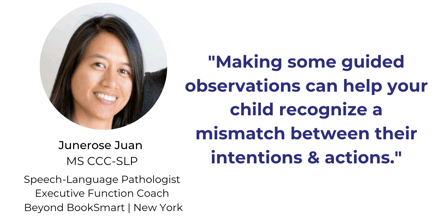 From there, you could ask if there's a better feeling to have right before bedtime than being excited. They may say that feeling relaxed is a better fit for that time of day -so that their mind can have time to slow down. Help them identify activities that give them a relaxed feeling. Maybe it's sketching, meditation, a warm shower, or something else that works for them. Instead of telling them what to do, you've allowed them an opportunity to understand themselves and their needs and adjust their actions accordingly (with a little guidance from you, of course!) The more we can get our kids to reflect on their thoughts and actions, the stronger their self-awareness will become - another long-lasting skill.
From there, you could ask if there's a better feeling to have right before bedtime than being excited. They may say that feeling relaxed is a better fit for that time of day -so that their mind can have time to slow down. Help them identify activities that give them a relaxed feeling. Maybe it's sketching, meditation, a warm shower, or something else that works for them. Instead of telling them what to do, you've allowed them an opportunity to understand themselves and their needs and adjust their actions accordingly (with a little guidance from you, of course!) The more we can get our kids to reflect on their thoughts and actions, the stronger their self-awareness will become - another long-lasting skill.
Tip 4: Help Your Student Feel Autonomous
Kids and teens naturally want to feel like they’re independent and making their own choices. Parents can tap into this strategically by allowing their children as many opportunities to make their own decisions as possible. There are many ways to accomplish this depending on the context. For example, if there are a number of tasks that need to be done around the house, give them the opportunity to choose what they want to do rather than assigning it. This simple act allows them to have a say in what happens, even if it’s not their favorite activity in the world. That’s a win/win for both of you!
A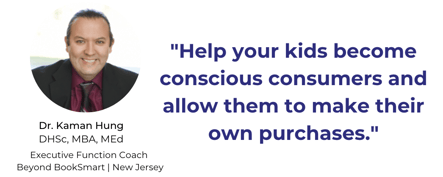 ccording to Dr. Hung, another easy strategy to build your child’s sense of autonomy is to allow them opportunities to make their own purchases. This can be particularly helpful when it comes to areas related to hygiene and self-care. For example, if your teenager isn’t using the deodorant you supplied for them, you might encourage them to go to the store and pick out something themselves. By allowing them the opportunity to pick out their toiletries, you’re also allowing them the chance to build ownership over these routines.
ccording to Dr. Hung, another easy strategy to build your child’s sense of autonomy is to allow them opportunities to make their own purchases. This can be particularly helpful when it comes to areas related to hygiene and self-care. For example, if your teenager isn’t using the deodorant you supplied for them, you might encourage them to go to the store and pick out something themselves. By allowing them the opportunity to pick out their toiletries, you’re also allowing them the chance to build ownership over these routines.
The Takeaway
By now, you’ve probably taken an idea or two away from this group that you can try at home. If you want to hear the panelists’ complete suggestions, we invite you to watch the full webinar on-demand for free below. And remember - summer is the perfect time to build these skills. The more your student works on these skills now, the better prepared they’ll be for the school year ahead!
Top photo by Andrea Piacquadio from Pexels
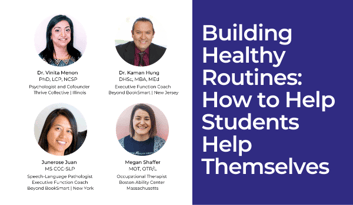 Want more tips? Listen to these panelists dive deeper into the subject of self-care and healthy routines in our free, on-demand webinar.
Want more tips? Listen to these panelists dive deeper into the subject of self-care and healthy routines in our free, on-demand webinar.

